Genus: Cymbospondylus LEIDY, 1868
Etymology: Greek, kymbe, “cup, hollow vessel” and Greek, spondylos, “vertebra”:
Cup vertebrae.
= Chonespondylus LEIDY, 1868
Etymology: Greek, kone, “funnel” and Greek, spondylus, “vertebra”:
Funnel vertebrae.
Species: piscosus LEIDY, 1868
Etymology:
Holotype:
Locality: New Pass, Toiyabe Range, about 30 miles west of Austin, Lander County,
Nevada.
Horizon: Prida Formation.
Biostratigraphy:
Age: Anisian Stage, Lower Mid Triassic Epoch, Middle Triassic.
Material: Nearly complete dorsal vertebrae with parts of 4 others.
Referred material:
= Cymbospondylus petrinus LEIDY, 1868
Etymology:
Holotype:
Locality: Star Canyon, West Humboldt Range, Humbolt County, Nevada.
Horizon: Prida Formation.
Biostratigraphy:
Age: Anisian Stage, Lower Mid Triassic Epoch, Middle Triassic.
Material:
Referred material:
UCMP 8120, 8128, 9943, 9947: Fragmentary skeletons.
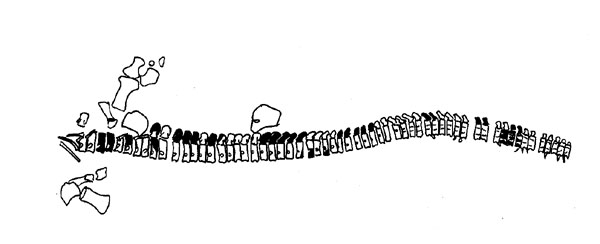
UCMP 9954: Skull.
Locality: American Canon, West Humboldt Range, Humbolt County, Nevada.
Horizon: Prida Formation.
Biostratigraphy:
Age: Anisian Stage, Lower Mid Triassic Epoch, Middle Triassic.
Material:
9154: Fragmentary skeleton.
UCMP 9950: Skull and skeleton missing the posterior caudals.

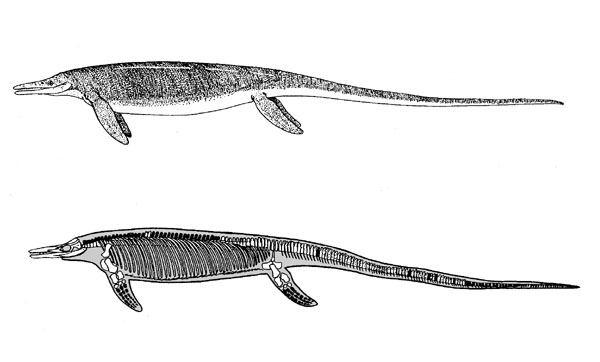

UCMP 9913: Skull.
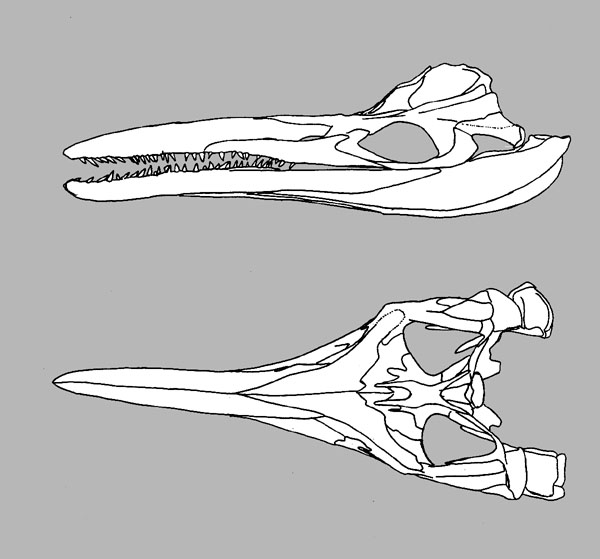
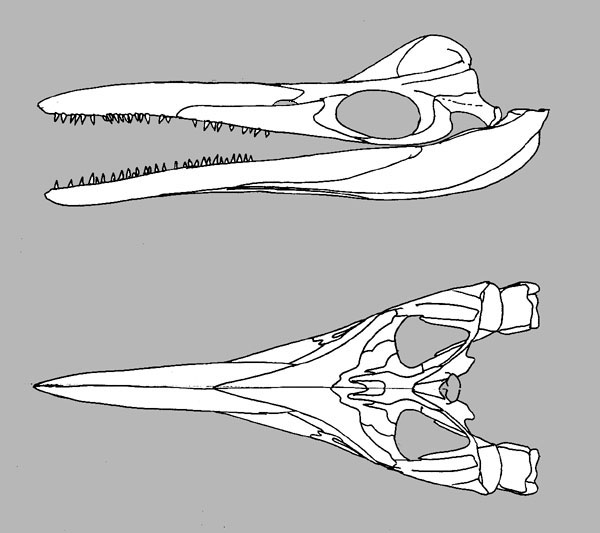
= Chonespondylus grandis LEIDY, 1868
Etymology: Latin, grandis, "large, grown up."
= Cymbospondylus (?) grandis (LEIDY, 1868)
Holotype:
Locality:
Horizon:
Biostratigraphy:
Age:
Material:
_____________________________________________________________________________________
Species: nevadanus MERRIAM, 1908
Etymology: In reference to Nevada, where the specimen was discovered.
Holotype: UCMP 10620
Locality: New Pass, Toiyabe Range, about 30 miles west of Austin, Lander County,
Nevada.
Horizon: Prida Formation.
Biostratigraphy:
Age: Anisian Stage, Lower Mid Triassic Epoch, Middle Triassic.
Material: Fragmentary skeleton.
Referred material:
UCMP 10821: Isolated vertebral centrum.
_____________________________________________________________________________________
Species: germanicus HUENE, 1916 (nomen
dubium)
Etymology: In reference to Germany, where the specimen was found.
= Ichthyosaurus atavus var major E. FRAAS, 1891 (partim)
Etymology:
Holotype:
Locality: Germany.
Horizon: Muschelkalk beds, Wellen-Dolomit.
Biostratigraphy:
Age: Anisian Stage, Lower Mid Triassic Epoch, Middle Triassic.
Material: Basioccipital, neural arch, and vertebrae.
Referred material:
CORROY 1928
Locality: Blainville, Eastern France.
Horizon:
Biostratigraphy:
Age: Lower Lettenkohle, Middle Triassic.
Material:
Number: Not given: Vertebral column. This may not be Cymbospondylus.
_____________________________________________________________________________________
Species: parvus HUENE, 1916
Etymology: Latin, parvus, "little, small."
Number: ETHGI Fr 214 & PIMUZ A/III 175
Locality: Laufenburg, Baden-Wurttemberg State, Germany.
Locality: Muschelkalk beds, Wellenkalk, Wellen-Dolomit
Biostratigraphy:
Age: Anisian Stage, Lower Mid Triassic Epoch, Middle Triassic.
Material: Anterior dorsal centra and a complete mid-dorsal centrum.
Referred material:
Locality: Northern Switzerland.
Horizon: Wellenkalk.
Biostratigraphy:
Age: Anisian Stage, Lower Mid Triassic Epoch, Middle Triassic.
Material:
Number: Not given: 2 centra.
_____________________________________________________________________________________
Species: buchseri SANDER, 1989
Etymology:
Holotype: PIMUZ T 4351
Locality: Cava Tre Fontane, Monte San Giorgio, Ticino Canton, Switzerland.
Horizon: Grenzbitumenzone Beds.
Biostratigraphy:
Age: Anisian-Ladinian boundary, Lower Mid Triassic Epoch, Middle Triassic.
Material: Skull and skeleton missing distal ends of fore limbs and from just
in front of the pelvis.
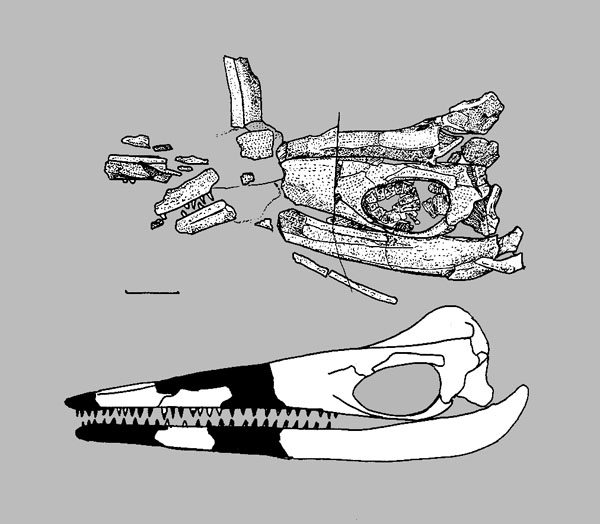
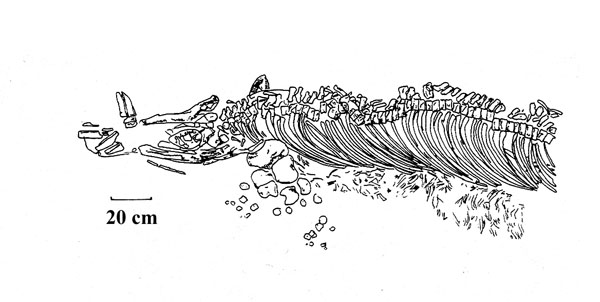

Referred material:
= Shastasaurus sp KUHN-SCHNYDER, 1980
Locality: Seceda, Trention-Alto Adige, Italy.
Horizon: Buchensteiner Schihten.
Biostratigraphy:
Age: Ladinian Stage, Upper Mid Triassic Epoch, Middle Triassic.
Material:
Number: Not given: Four fragments of the middle and posterior dorsal vertebral
column with 3 to 8 vertebrae each, assorted rib fragments, 3 isolated vertebral
centra, and fragments of pubis and hind limb.
_____________________________________________________________________________________
Species: nichollsi FRÖBISCH, SANDER & RIEPPEL, 2006
Etymology: In memory and honour of Dr. Elizabeth L. Nicholls, curator of marine
reptiles at the Royal Tyrell Museum, Drumheller, Canada, for her work on Triassic
ichthyosaurs, with greatly contributed to the increased knowledge and understanding
of the
group.
= Nova STOECKER, 2003
Holotype: FMNH PR2251
Locality: Exact locality on file at the FMNH, T25N, R39E, Section 14, USGS
Cain Mountain 7.5' quadrangle, 1990 provisional edition, Augusta Mountains,
Pershing County, Nevada.
Horizon: Fossil Hill Member, Favret Formation.
Biostratigraphy:
Age: Anisian Stage, Lower Mid Triassic Epoch, Lower Middle Triassic.
Material: Anterior half of an articulated skeleton, comprising the skull without
the rosturm, articulated vertebral column with neural arches and ribs, extending
to the middle dorsal region, and parts of the shoulder girdle.
Note: Has pit marks on the parietal plateau.
Note: With zygopophyseal fusion, with accompanying bone rugosity and malformation, in cervicla vertebrae 6-9 (PARDO-PEREZ, KEAR, GOMEZ, MORONI & MAXWELL, 2018).
_____________________________________________________________________________________
Species: duelferi KLEIN, SCHMITZ, WINTRICH & SANDER, 2020
Etymology: In honor of preparator Oalf Dülfer, for his many practical conributions to Mesozoic marine reptile research.
Holotype: LACM DI 158109
Locality: LACM 8031, nothern slope of the rear of Favret Canyon, Augusta Mountains, Pershing County, Nevada.
Horizon: Upper third Fossil Hill Member, Favret Formation.
Biostratigraphy: Rotelliformes or Meeki Zones.
Age: Anisian Stage, Early Middle Triassic Epoch, Early Middle Triassic.
Material: An incomplete and partially disarticulated skelton preserving an anteriorly incomplete skull, shoulder girdel elemetns, parts of both forelimbs, ribs and vertebrae.








